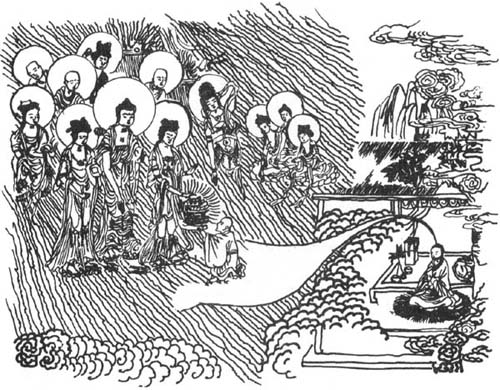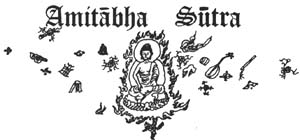|
All Buddhist Sutra have two names, the common and the special. The
special name of this Sutra is The Buddha Speaks of Amitabha. The word Sutra
is the common name of all Sutras.
There are five kinds of beings who can speak Sutras:
1. The Buddha,
2. The Buddha’s disciples,
3. Gods,
4. Immortals, and
5. Transformation people.1
Disciples,
gods, immortals, and transformation people must first receive the Buddha's
certification before they can speak Sutras for without it, Sutras are not truly
being spoken. This Sutra was spoken by the Buddha himself not by gods,
immortals, transformation people, or disciples; it was spoken from Sakyamuni
Buddha's own mouth.
Because
its principles were too profound and wonderful for the Sravakas2 or the
Bodhisattvas to comprehend, no one requested this Pure Land Dharma door. It had
to be spoken, however, and so the Buddha spontaneously revealed this important
Dharma, doubly so because it will be the last to disappear in the Dharma-ending
age.
**************
1A deva (heavenly being) or Buddha transformed into human shape.
2"Sound Hearers" i.e. disciples who became enlightened upon
hearing the Buddha preach the Four Holy Truths.
In
the future the Buddhadharma will become extinct. Because the demon kings fear
the Surangama Sutra most, the Surangama Sutra1 will be the first to
disappear, for without the Sutra no one will be able to recite the mantra. Then, one by one, the other Sutras will disappear. We now have the black
words of the text on white paper, but in the future, when the Buddhadharma is
about to vanish, there will be no words on the paper. The words will disappear
and ail the Buddha's Sutras will vanish. The last to go will be the Amitabha
Sutra, which will remain in the world an additional hundred years and ferry
limitless, measureless living beings across the sea of suffering to the shore of
Nirvana. When the Amitabha Sutra has become extinct, the great phrase
"Namo2 Amitabha Buddha" will remain among men for a hundred years and
ferry measureless living beings across. Next, the word "Namo" will be
lost and only "Amitabha Buddha" will remain for another hundred years
after which the Buddhadharma will be extinguished. Because this Sutra will be
the last to disappear, it is extremely important.
I.
An Explanation of the Title.
Sutra:
THE
BUDDHA.
Commentary:
What
is a Buddha? The Buddha is the greatly enlightened one; his great enlightenment
is an awakening to all things, without a particle of confusion. A true Buddha
has ended karma and emptied emotions, he is without karmic obstacles and empty
of emotional responses. On the other hand we find living beings with heavy karma
and confused" emotions. Attached to emotions and love, common men with
heavy karma and confused emotions are simply living beings.
The
Buddha has three kinds of Enlightenment:
1.
Basic enlightenment: Enlightened at the root source;
2.
Beginning enlightenment: Initial stages of enlightenment;
3.
Ultimate enlightenment: Completely enlightened to the utmost limit.
**************
1T.945.
2From the Sanskrit namah "I bow" interpreted as "I take
refuge."
You
can also say that he is
1. Self-enlightened, that he
2.
Enlightens others, and that he is
3.
Complete in enlightenment and practice.
1.
Self-enlightenment: Common men are unenlightened. They think themselves
intelligent when they are actually stupid. They gamble thinking they will
win--who would have guessed they'd lose? Why are they so confused? It is because they do things, which they clearly know are wrong. The more
confused they are, the deeper they sink into confusion; the deeper they sink,
the more confused they become.
You
should become enlightened. The Buddha is a part of all living beings and is one
of them himself, but because he is enlightened instead of confused, he is said
to be self-enlightened and not like common men. Sravakas of the Hinayana are
"independents"; self-enlightened, they do not enlighten others.
2.
Bodhisattvas enlighten others, unlike the Sravakas who think only of themselves.
Bodhisattvas choose to benefit all living beings and don't ask living beings for
anything in return. Using their own methods of self-enlightenment, they convert
all beings, causing them to attain the doctrine of enlightenment and
non-confusion. This is practicing the Bodhisattva conduct.
Sound
Hearers cultivate the Four Holy Truths:
1}
Suffering,
2)
Origination,
3)
Stopping (extinction), and
4)
The Way.
They
also cultivate the Twelve Causes and Conditions:
1}
Ignorance conditions...
2)
Action, action conditions...
3)
Consciousness, consciousness conditions...
4)
Name and form, name and form conditions...
5)
The six sense organs, the six sense organs condition...
6)
Contact, contact conditions...
7)
Feeling, feeling conditions...
8)
Craving, craving conditions...
9)
Grasping, grasping conditions...
10)
Becoming, becoming conditions...
11)
Birth, and birth conditions...
12)
Old age and death.
The
twelve all come from ignorance, and ignorance is merely not understanding.
Without ignorance, the Twelve Conditioned Causes cease to exist but if you
flounder in ignorance, you are caught by the remaining Causes.
Those
of the Hinayana cultivate the Dharma, but Bodhisattvas transcend all successive
stages, cultivating the Six Perfections and the Ten-Thousand Conducts.1
The
Six Perfections are
1)
Giving. Giving transforms stinginess. Greedy people who can't give should
practice giving for unless they learn to give, they cannot eliminate their
stinginess.
2)
Morality. Precepts (i.e. the guides to perfect conduct) eliminate offenses,
transgressions and evil deeds. Keep the precepts.
3)
Patience. Patience transforms hatred. If you have a big temper, cultivate
patience and bear with things. Don't be an asura, a fighter, who gets angry all
day and is not on speaking terms with anyone unless it's to speak while glaring
with fierce, angry eyes. Be patient instead.
4)
Vigor. Vigor transforms laziness. If you're lazy, learn to be vigorous.
5)
Dhyana concentration.
6)
Wisdom. Most of all you need Prajna wisdom to transform stupidity. If you have no wisdom, give rise to Prajna and transform your stupidity.
The bright light of wisdom abolishes the darkness of stupidity.
Bodhisattvas
cultivate these Six Perfections and also the Ten-Thousand Conducts.
Self-enlightened, they enlighten others, and are therefore unlike those of the
Hinayana.
3.
Complete enlightenment. This is wonderful enlightenment, the Buddha's
enlightenment. The Buddha perfects self-enlightenment and the enlightenment of
others, and when his enlightened practice is complete, he thereby realizes
Buddhahood.
"You
keep talking about the Buddha," you say, "but I still don't know what
a Buddha's."
You
don't know? I will tell you;
You
are the Buddha.
"Then
why don't I know it?” you ask.
Your
not knowing is just the Buddha! But this is not to say that you have already
realized Buddhahood. You are a "not-yet-become" Buddha. You should
understand that the Buddha became a Buddha from the stage of a living being. It
is just living beings who can cultivate to realize Buddhahood. The Buddha is the
Enlightened One, and when a human being becomes enlightened, he's a Buddha too.
Without enlightenment, he's just a living being. This is a general explanation
of the word BUDDHA.
**************
1All methods, practices, and procedures leading to enlightenment.
The
Buddha had Three Bodies, Four Wisdoms, Five Eyes, and Six Spiritual
Penetrations. You may be a Buddha, but you are still an unrealized Buddha, for
you do not have these powers. The Buddha cultivated from the stage of a common
person to Buddhahood, and has all the attributes of Buddhahood.
Some
who haven't become Buddhas claim to be Buddhas. This is the height of stupidity;
claiming to be what they are not, they thereby cheat themselves and cheat
others. Isn't this to be a "Great Stupid One"? Everyone can become a
Buddha, but cultivation is necessary. If one has the Three Bodies and the Four
Wisdoms one may call himself a Buddha. If one has just the Five Eyes or a bit of
Spiritual Penetration, one may not. The Three Bodies are:
1.
The Dharma body,
2.
The Reward body, and
3.
The Transformation body.
The
Four Wisdoms are:
1.
The Great Perfect Mirror Wisdom,
2.
Wonderful Observing Wisdom,
3.
Perfecting Wisdom, and
4.
Equality Wisdom.
The
Six Spiritual Penetrations are:
1.
The Heavenly Eye. The Heavenly Eye can see the gods and watch all their
activities.
2.
Heavenly Ear. The Heavenly Ear can hear the speech and sounds of the gods.
3.
Others Thoughts. Thoughts in others, minds which have not been spoken are
already known.
4.
Past Lives. With this penetration one can know the past.
5.
Extinction of Outflows. To be without outflows is to have no thoughts of sexual
desire, greed, hate, or stupidity. In general, once one gets rid of the
eighty-four thousand faults, one has no outflows. Outflows are like water
pouring through a leaky bottle. Originally there were outflows, but at this
stage the holes have been repaired.
6.
Complete Spirit. Also called the Penetration of the Spiritual Realm; this is an
inconceivably wonderful state.
The
Five Eyes:
1.
The Heavenly Eye,
2.
Buddha Eye,
3.
Wisdom Eye,
4.
Dharma Eye,
5.
Flesh Eye.
A
verse says,
The
Heavenly Eye penetrates without obstruction.
The
Flesh Eye sees obstacles and does not penetrate.
The
Dharma Eye only contemplates the common.
The
Wisdom Eye understands true emptiness.
The
Buddha Eye--like a thousand suns--
Illuminations
differ, but
Their
substance is one.
The
Heavenly Eye penetrates without obstruction and sees the affairs of eighty
thousand great kalpas. It cannot see beyond. The Flesh Eye can see those things,
which are obstructed. The Heavenly Eye sees those things, which are not
obstructed. The Dharma Eye contemplates the "mundane truth" and
observes all the affairs of worldly existence. The Wisdom Eye comprehends the
state of true emptiness.
Not
just the Buddha but everyone has a Buddha Eye. Some have their Buddha Eyes open
and some do not. The open Buddha Eye shines with the blazing intensity of a
thousand suns, and even though illuminations differ, their substance is the
same.
So
the Buddha has Three Bodies, Four Wisdoms, Five Eyes, and Six Spiritual
penetrations. If one has this talent one may call himself a Buddha, but if not,
one would be better off being a good person instead of trying to cheat people.
|

